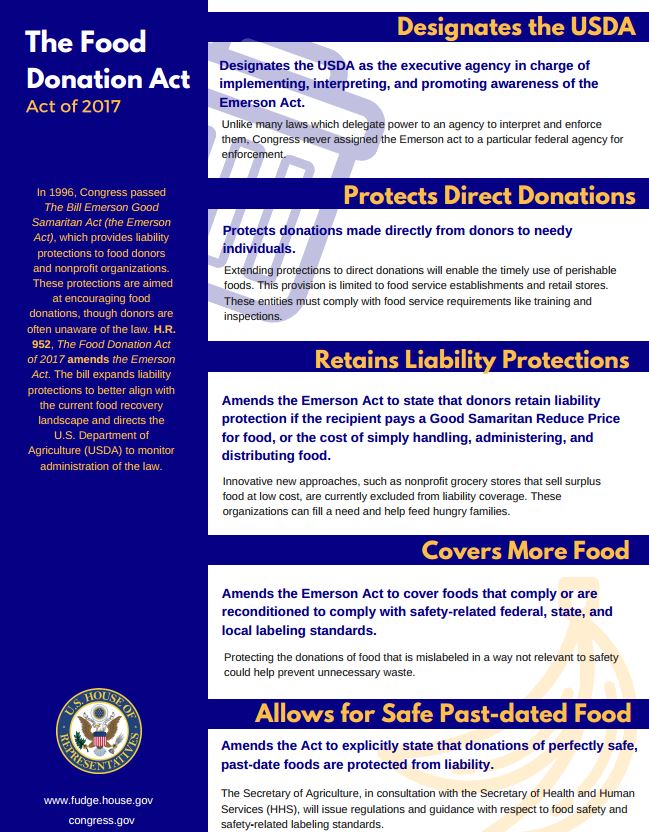In August of 2016, the ISTC blog featured information on an Illinois law geared toward increasing the donation of unused food from schools and other public agencies. That legislation addressed widespread confusion about protection from liability under the federal Bill Emerson Good Samaritan Food Donation Act (aka the Emerson Act), which went into effect in 1996. Now federal legislation has been introduced to amend the Emerson Act in ways that will also hopefully encourage food donation.
In February US Representatives Marcia L. Fudge (D-OH), Dan Newhouse (R-WA), Chellie Pingree (D-ME), and James P. McGovern (D-MA) introduced HR 952, The Food Donation Act of 2017. The goals of this proposed legislation are to clarify and expand liability protections offered under the Emerson Act to better align with the current food recovery landscape. As outlined on Representative Fudge’s web site, HR 952 would:
- Designate the USDA as the executive agency in charge of implementing, interpreting, and promoting awareness of the Emerson Act. Congress had never assigned the Emerson Act to a particular federal agency for enforcement.
- Protect donations made directly from donors to needy individuals. This provision is limited to food service establishments and retail stores, and these entities must comply with food service requirements like training and inspections. This particular update of the Emerson Act is important to ensure the timely use of perishable items. Currently the Emerson Act limits protections to food provided to social service agencies (e.g. food banks or soup kitchens).
- Amend the Emerson Act to state that donors retain liability protection if the recipient pays a Good Samaritan Reduce Price for food, or the cost of simply handling, administering, and distributing food. This provision would, for example, extend liability protections to non-profit grocery stores that sell surplus food at reduced prices (e.g. Daily Table in Dorchester, MA)
- Amend the Emerson Act to cover foods that comply or are reconditioned to comply with safety related federal, state, and local labeling standards. In this way, donations of food that was mislabeled in a way unrelated to safety would be protected, to help keep such items out of the waste stream.
- Allow for donation for safe “past-dated” food. In this way items that are beyond a listed “Sell By” date, but which are still perfectly safe to eat, could be covered under liability protections. As noted on the ISTC blog earlier this week, industry is working to change the way it labels food to minimize consumer confusion, and elimination of “sell by” dates that really don’t reflect food safety are part of the proposed changes. But until labeling changes have been widely adopted, this provision could help reduce unnecessary food waste. The text of HR 952 directs that “Not later than 180 days after the date of the enactment of this Act, the Secretary of Agriculture shall, in consultation with the Secretary of Health and Human Services, issue regulations with respect to the safety and safety-related labeling standards of apparently wholesome food and an apparently fit grocery product under section 22 of the Child Nutrition Act of 1966 (42 U.S.C. 1791).”
If passed this legislation could provide another important step toward the national goal to reduce food waste by half by the year 2030, in alignment with Target 12.3 of the UN Sustainable Development Goals.
For further information, see the press release on HR 952 on Representative Fudge’s web site, updates on the bill (including its text) on Congress.gov, and the Food Donation Act of 2017 fact sheet.



